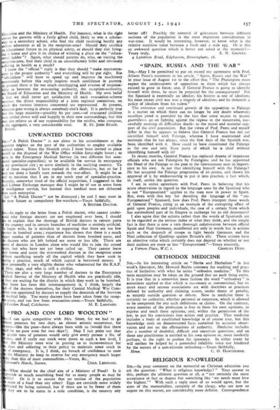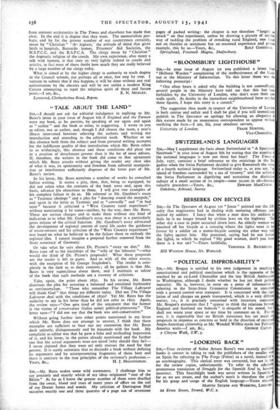RELIGIOUS KNOWLEDGE
SIR,—In your comment on the memorial on Christian education you ask the question: " What is religious knowledge? " Your answer to this, perhaps the ultimate question of all, is " not certainly the mere acceptance of fact or dogma but something like we needs must love the highest." With such a reply most of us would agree, but the aims of the memorialists, certainly of the clergy, who are now so urgent on this matter, are considerably more definite. Correspondence from eminent ecclesiastics in The Times and elsewhere has made that clear. In the end it is dogma that they want. The memorialists per- haps, and by far the greater number of our countrymen certainly, mean by " Christian " th- highest,' the attitude of mind that gives birth to hospitals, Bamardo homes, Prisoners' Aid Societies, the N.S.P.C.C. and the R.S.P.0 A. The clergy mean by " Christian " the dogmatic religion of the creeds. My own experience, after many a talk with laymen, is that tney sit very lightly indeed to creeds and articles, in fact most of them doubt how much they are really believed by a large number of the clergy today.
What is aimed at by the higher clergy is authonty to teach dogma in.the Council schools, not perhaps all at once, but step by step. I venture to submit that if this happens it will be done without any real authorisation by the electors and will be not unlike a modern King Canute attempting to repel the religious spirit of these and future



























 Previous page
Previous page